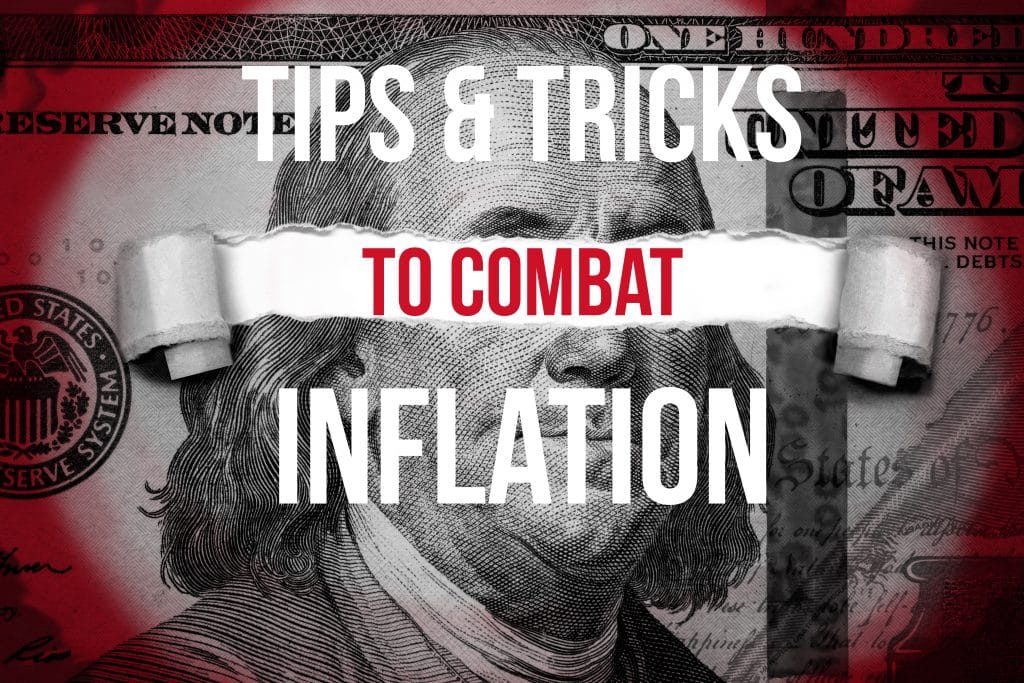Tips and Tricks to Combat Inflation.

You hear the term mentioned frequently these days: Inflation. But it makes you wonder, what is inflation? The Bureau of Labor Statistics defines inflation as “the overall general upward price movement of goods and services in an economy.” For the rest of us, it just means we’re all paying more for just about everything.
While inflation can be unpleasant to our wallets, economists agree that a modest level of inflation is a sign of a strong economy. Still, that’s little comfort for those of us who are having to stretch our paychecks farther. Yet, while inflation impacts us all to a degree, it doesn’t spread the pain equally. Investors and wage earners typically come out ahead. Savers and those living on a fixed income are often negatively impacted.
Whatever your financial situation, there are ways to protect yourself in inflationary times. Here are some tips from our financial experts:
Buy in bulk.
During a period of inflation, some items go up in price faster than others. So be sure to monitor the cost of those things you buy most. You might consider stocking up on certain items now to avoid rising costs later. Things you know you’ll need, like canned food items, frozen foods, and laundry detergent, are a good start. Keep in mind that this tactic works best with temporary inflation.
Make essential purchases sooner rather than later.
Are you in dire need of a new car or a household appliance? Don’t wait. During an inflation, those big-ticket items tend to rise in price faster and more dramatically. If you drag your feet on making the purchase, that could potentially add hundreds of dollars to your bill. That said, if you are just casually
Examine your debt carefully.
If you currently have debt – and most of us do in the form of mortgages, car loans, and credit cards — inflation is actually your friend. Why? Because inflation lets you pay back your lenders with money worth less than when you originally borrowed it.
But proceed with caution. History shows us that inflation and higher interest rates almost always go hand in hand. While your fixed-rate loans will be unaffected by any change, your adjustable-rate loans are highly vulnerable to a rate hike. If you have variable-rate loans, you may want to consider refinancing them to a fixed rate now. Another option would be to prioritize your variable rate loans and pay them down faster.
Reassess your budget.
During inflationary times, we all have less buying power. Why? Because our dollar doesn’t go as far. So, now is an ideal time to reexamine your budget and prioritize your costs. As the price of necessities, like food and clothing, rises, consider a few areas you might want to cut back on to compensate. Assess wants versus needs and budget appropriately.
Monitor your salary.
If your salary stays the same during an inflation, you’re essentially making less money. Be sure to set up a review with your superiors regarding your compensation and come prepared with numbers. It’s perfectly acceptable to ask for a cost-of-living raise, although there is no guarantee you’ll get it.
Invest in stocks.
One of the most effective long-term ways to beat inflation is through investments. Now is a good time to think about adding more to investment assets, such as college savings, 401k savings, and other retirement plans. If you have any accounts geared for more short-term purposes, like money markets, you may want to shift them into longer-term options. Keep in mind that you should always keep your emergency fund in a separate, liquid account, should you need it.
Invest in real estate if you can.
Real estate tends to maintain or increase in value over time, making it a popular financial tool for those trying to beat the effects of inflation. If you’ve had your eye on buying a home or even refinancing your existing mortgage, now may be a good time to make a move.
Overall, try not to stress too much. A few months of higher-than-average inflation isn’t a reason to lose sleep. What matters is how high and fast inflation grows over time. There’s a difference between a one-time bump versus a sustained increase. As long as you’ve done adequate financial planning, you should be able to weather the storm without any major damage to your finances.
Posted In: Tips For Managing Finances




